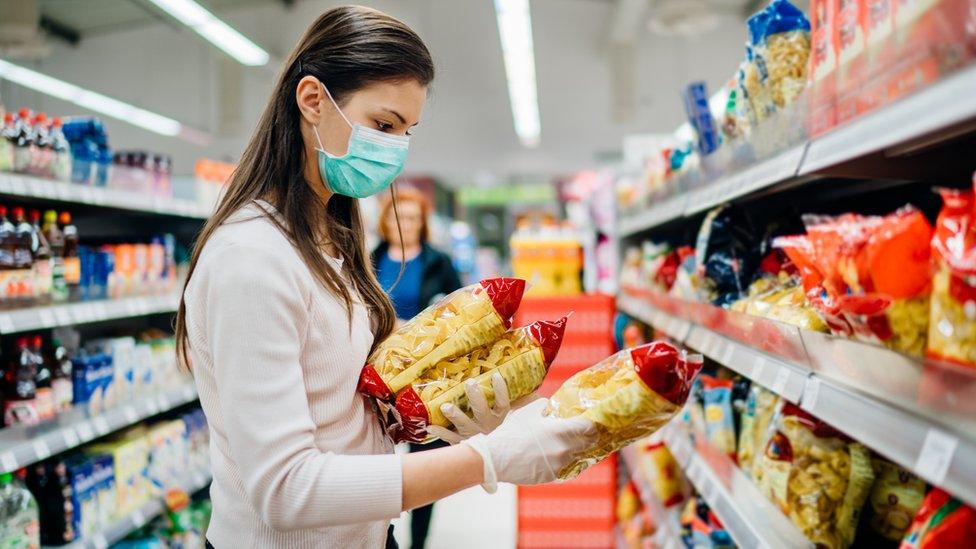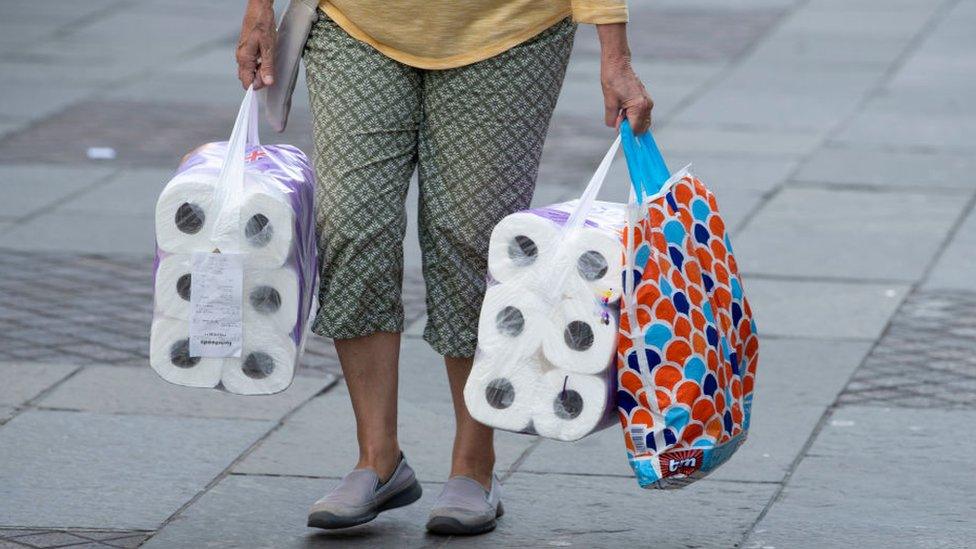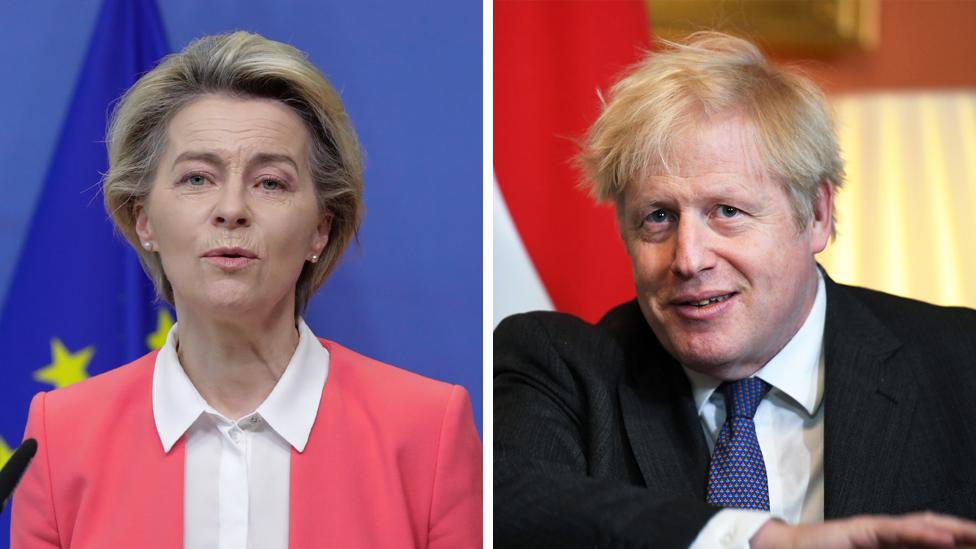Britons told not to stockpile food ahead of January
- Published
- comments

Households have been warned not to stockpile food and toilet roll ahead of 1 January when the UK stops trading under EU rules.
On Sunday, the UK and the EU agreed to extend a deadline aimed at reaching a deal on post-Brexit trade.
The British Retail Consortium (BRC) said ongoing uncertainty made it harder for firms to prepare for the New Year.
But it said shops had plenty of supplies and shoppers must not buy more food than usual.
"Retailers are doing everything they can to prepare for all eventualities on 1 January - increasing the stock of tins, toilet rolls and other longer life products so there will be sufficient supply of essential products," said BRC chief executive Helen Dickinson.
"While no amount of preparation by retailers can entirely prevent disruption there is no need for the public to buy more food than usual as the main impact will be on imported fresh produce, such as fresh fruit and vegetables, which cannot be stored for long periods by either retailers or consumers."
Supermarkets are now used to dealing with anxious shoppers.

Supermarkets had to impose limits on some goods during coronavirus lockdowns this year
During the first lockdown earlier this year to stop the spread of the coronavirus, grocers introduced limits on goods such as toilet roll, dried pasta and UHT milk after panic buying by Britons.

The basics
Brexit happened but rules didn't change at once: The UK left the European Union on 31 January 2020, but leaders needed time to negotiate a deal for life afterwards - they got 11 months.
Talks are happening: The UK and the EU have until 31 December 2020 to agree a trade deal as well as other things, such as fishing rights.
If there is no deal: Border checks and taxes will be introduced for goods travelling between the UK and the EU. But deal or no deal, we will still see changes.

There are fears shoppers might think disruption at ports after 31 December could lead to shortages in shops as the UK transitions to new trading rules with the EU.
The UK and the EU have agreed to carry on trade talks past Sunday's deadline.
In a joint statement, Prime Minister Boris Johnson and European Commission President Ursula von der Leyen said it was "responsible at this point to go the extra mile".
But Mr Johnson told the BBC the two sides are "still very far part on some key things", and said the "most likely" course is an Australian-style trade deal with the EU.
He admitted that this type of deal "it is not where we wanted to get to but if we have to end up with that solution the UK is more than prepared".
However, Ms Dickinson warned: "Without a deal, the British public will face over £3bn in food tariffs and retailers would have no choice but to pass on some of these additional costs to their customers who would see higher prices filter though during 2021."
Other business groups welcomed the extension to trade talks but also cautioned that it was imperative that the UK avoid a no deal Brexit with the EU.
"The news that talks will continue gives hope," said Tony Danker, director-general of the CBI business lobby group. "A deal is both essential and possible."


This torture is better than no deal. The fact that talks are ongoing is a good thing. Business groups are unanimous in their view that if a deal is at all possible, it should be pursued with every last effort.
However, the problem with this uncertainty is two-fold.
First, political and business timetables are getting increasingly misaligned by the day. Businesses need to know whether tariffs are coming or not as it effects pricing of products and services for next year. How can firms place or take an order if they don't know what that price needs to be?
Second, there is a danger that businesses who watch this process being dragged out will take their eye off the ball while waiting for some rabbit to appear out of the hat.
No deal is very bad but a deal still leaves an awful lot of work to do in preparing for new procedures, for example customs, that will change in any event.
But the fact remains that while this may be torture, it could be worse. No deal would not put UK business out of its misery - it could put some sectors out of business.

While Mr Danker said that "ongoing delays are frustrating and cost businesses," he urged the government to "make use of the time".
"Government must move with even more determination to avoid the looming cliff edge of 1 January."
'Statecraft failure'
British Chambers of Commerce director general Adam Marshall said it is a "very frustrating time for business".
But he added: "If a few more hours or days makes the difference, keep going and get an agreement that delivers clarity and certainty to businesses and trade on both sides. Businesses will need time and support to adjust in a New Year like no other - whatever the eventual outcome."
Mike Hawes, head of the motor industry's trade body, the SMMT, said that although it was good the two sides will continue to talk, they must now "finish the job". A no-deal "would be nothing less than catastrophic for the automotive sector, its workers and their families and represent a stunning failure of statecraft. Quite simply, it has to be ruled out," he said.
And Make UK, the manufacturers' trade body, said that after more than four years of uncertainty "UK manufacturers are now facing the most challenging start to the New Year, dealing with a pandemic and the risk of having no trading arrangement with our largest market".
News that talks will continue pushed sterling higher against the euro and dollar, although trading on Sunday would have been limited. Against the dollar, the pound rose 1.1% to $1.3360, compared with Friday's close. Against the euro, it strengthened 1% to 90.58 pence.
Sterling fell to a one-month low last week on fears Britain would leave the EU without a deal.


- Published13 December 2020

- Published13 December 2020